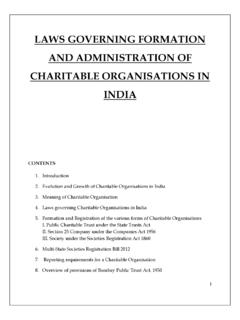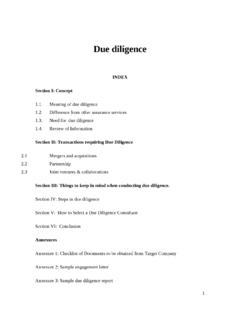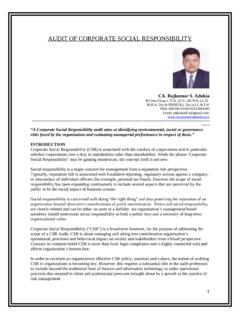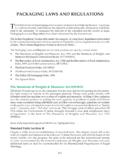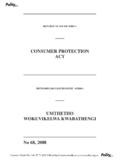Transcription of CONSUMER PROTECTION LAWS OF INDIA - …
1 CONSUMER PROTECTION laws by Rajkumar S. Adukia 1 CONSUMER PROTECTION laws OF INDIA BY RAJKUMAR S ADUKIA B. Com (Hons.), FCA, ACS, ACMA, , , Dip IFRS (UK), Dip LL & LW, DIPR, Dip in Criminology Email: CONSUMER PROTECTION laws by Rajkumar S. Adukia 2 Index 1. Introduction Who is a CONSUMER ? CONSUMER Advocacy CONSUMER awareness CONSUMER Rights Consumers Responsibilities 2. CONSUMER PROTECTION International scenario United Nations Guidelines for CONSUMER PROTECTION Consumers International (CI) 3. Historical background of CONSUMER PROTECTION laws in INDIA 4. CONSUMER PROTECTION legislations in INDIA 5. CONSUMER PROTECTION Act, 1986 History of CONSUMER PROTECTION Act Objective of the Act Important terms under the CONSUMER PROTECTION Act Who is a CONSUMER ?
2 Complaint Unfair Trade Practice Restrictive Trade Practice Defective goods Deficiency in service Trader / Manufacturer Hazardous goods Procedure to file complaint 6. CONSUMER PROTECTION Bill, 2015 7. Right to Information Act, 2005 8. Overview of the MRTP Act, 1969 9. Overview of the Competition Act, 2002 10. Authorities / Organisations related to CONSUMER PROTECTION Department of CONSUMER Affairs (DCA) CONSUMER PROTECTION laws by Rajkumar S. Adukia 3 CONFONET Scheme National CONSUMER Helpline Council for Fair Business Practice CONSUMER Courts CONSUMER PROTECTION Councils CONSUMER Care Guidance Centers (Grahak Suvidha Kendra) Centre for CONSUMER Studies (CCS) 11. Important websites and addresses CONSUMER PROTECTION laws by Rajkumar S.
3 Adukia 4 1. INTRODUCTION It is good to have money and the things that money can t buy, but it s good too, to check up once in a while and make sure you haven t lost the things money can t buy. George Lorimer, American editor & writer When we buy a good or service, we rarely have adequate knowledge about its quality and safety. We are quite concerned about getting cheated. This is when the need for CONSUMER PROTECTION arises. In the past few years, the subject of CONSUMER PROTECTION has become a matter of increasing public concern because unscrupulous business tactics seriously affect the nation s well-being by contributing to social unrest and by causing undue financial distress to consumers. The CONSUMER is the one who pays to consume the goods and services produced.
4 As such, consumers play a vital role in the economic system of a nation. In the absence of their effective demand, the producers would lack a key motivation to produce, which is to sell to consumers. Economic activity flourishes when consumers can trust producers, but the CONSUMER must have reasonable grounds for trust. Consumers will then value, not only quality and safety, but also the assurance of quality and safety. Therefore trust depends on assurance. Producers generally gain by providing assurance, so they seek to build, expand and project a good reputation. Producers demonstrate quality and safety and make the content of promises clear and publicly understood by means of advertisements, displays, sales assistance, labeling and packaging etc.
5 But when some form of damage or undue hazard arises, then the trust of the CONSUMER goes off. Generally CONSUMER PROTECTION comes in the form of government regulations. CONSUMER PROTECTION is a group of laws and organizations designed to ensure the rights of consumers as well as fair trade, competition and accurate information in the marketplace. The laws are designed to prevent businesses that engage in fraud or specified unfair practices from gaining an advantage over competitors. They may also provide additional PROTECTION for those most vulnerable in society. CONSUMER PROTECTION laws by Rajkumar S. Adukia 5 Who is a CONSUMER ? A CONSUMER is defined as someone who acquires goods or services for direct use or ownership rather than for resale or use in production and manufacturing.
6 A CONSUMER is one who decides whether or not to buy an item at the store, or someone who is influenced by advertisement and marketing. Every time someone goes to a shop and buys a thing, they make a decision as a CONSUMER . In the fields of economics, marketing and advertising, a CONSUMER is generally defined as the one who pays to consume the goods and services produced by a seller ( , company, organization). A CONSUMER can be a person (or group of people), generally categorized as an end user or target demographic for a product, good, or service. CONSUMER means any person who - (i) buys any goods for a consideration which has been paid or promised or partly paid and partly promised, or under any system of deferred payment, and includes any user of such goods other than the person who buys such goods for consideration paid or promised or partly paid or partly promised, or under any system of deferred payment when such use is made with the approval of such person, but does not include a person who obtains such goods for resale or for any commercial purpose.
7 Or (ii) hires or avails of any services for a consideration which has been paid or promised or partly paid and partly promised, or under any system of deferred payment, and includes any beneficiary of such services other than the person who hires or avails of the services for consideration paid or promised, or partly paid and partly promised, or under any system of deferred payment, when such services are availed of with the approval of the first mentioned person; (but does not include a person who avails of such services of any commercial purpose). ( (d) of the CONSUMER PROTECTION Act, 1986) According to this definition, a person to be a CONSUMER of goods should satisfy that The goods are bought for consideration.
8 Any person who uses the goods with the approval of the buyer is a CONSUMER . Any person who obtains the goods for resale or commercial purposes is not a CONSUMER . CONSUMER PROTECTION laws by Rajkumar S. Adukia 6 Person buying goods for self-employment is a CONSUMER . A person is a CONSUMER of services if The services are hired or availed of. Consideration must be paid or payable. Beneficiary of services is also a CONSUMER . Goods are those products which are manufactured or produced and sold to consumers through wholesalers and retailers. Service means service of any description which is made available to the potential user with respect to the provision of facilities in connection with banking, finance, insurance, transport, supply of electrical or other energy, housing, construction, water supply, health, entertainment, amusement etc.
9 It does not include any service rendered free of charge or under a contract of personal service. CONSUMER Advocacy CONSUMER advocacy refers to actions taken by individuals or groups to promote and protect the interests of the buying public. Historically, CONSUMER advocates have assumed a somewhat adversarial role in exposing unfair business practices or unsafe products that threaten the welfare of the general public. CONSUMER advocates use tactics like publicity, boycotts, letter-writing campaigns, and lawsuits to raise awareness of issues affecting consumers and to counteract the financial and political power of the organizations they target. Since even large businesses can be visibly wounded when their mistreatment of consumers or other constituencies arouses the ire of CONSUMER advocacy organizations, it should be obvious to small business owners that they can ill-afford to engage in business practices that might draw the attention of CONSUMER advocates.
10 Periods of vocal CONSUMER advocacy around the turn of the twentieth century and in the late 1960s have left a legacy of legislations and agencies intended to protect consumers. The rights of consumers have expanded to include product safety, the legitimacy of advertising claims, the satisfactory resolution of grievances, and a say in government decisions. In the early days of industry, companies could afford to ignore consumers' wishes because there CONSUMER PROTECTION laws by Rajkumar S. Adukia 7 was so much demand for their goods and services. As a result, they were often able to command high prices for products of poor quality. The earliest CONSUMER advocates to point out such abuses were called "muckrakers," and their revelations of underhanded business practices spurred the creation of several federal agencies and a flurry of legislation designed to curb some of the most serious abuses.
